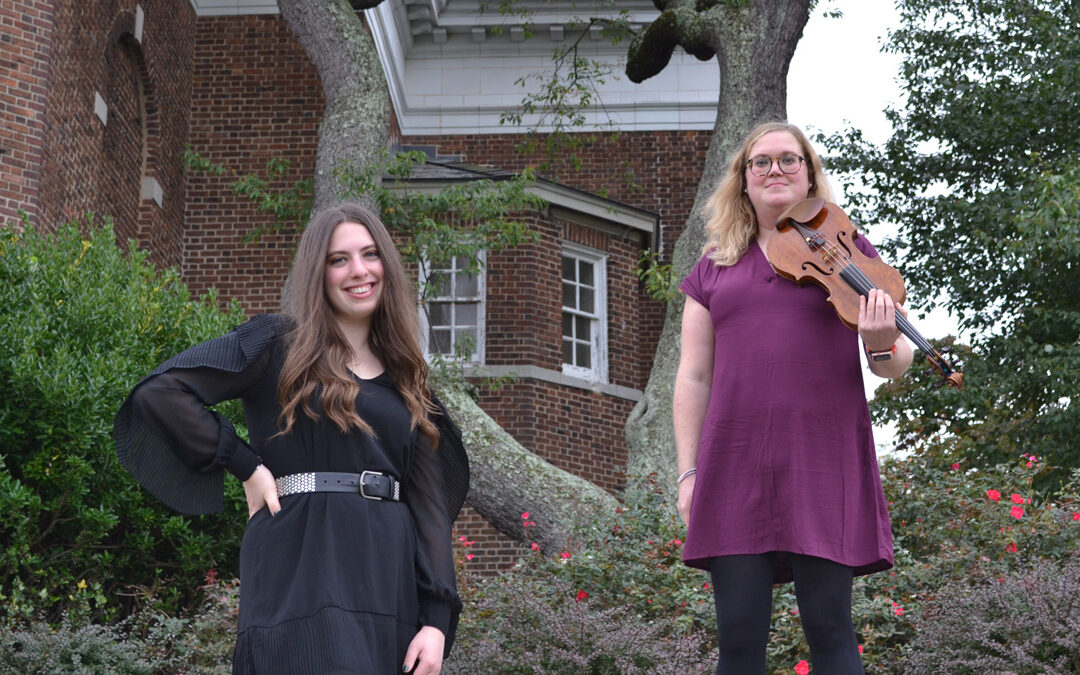It’s impossible to talk about the new school year without bringing up COVID-19. The pandemic upended university life in every way imaginable, drastically altering routines, expectations, and worldviews.
Rutgers is back to in-person, on-campus learning, and students are reflecting on their experiences. Just before the October 8 kickoff meeting of the Rutgers Global Health Institute Student Council, we spoke to the new co-presidents to find out, specifically, how the pandemic affected—and continues to affect—students’ lives, thoughts, and plans for the future.
New Jersey native Brooke Margolin, an undergraduate in the School of Environmental and Biological Sciences and the Edward J. Bloustein School of Planning and Public Policy, is studying public health and is on track for a master’s degree from the School of Public Health. Laura Palm, who grew up and got her medical degree in Germany, is pursuing a graduate degree in music performance at Mason Gross School of the Arts. They’re working together and with the rest of the council to represent the Rutgers student body within the institute and to create and facilitate opportunities for students to get involved in global health.
As students begin the new academic year, what are they saying about their experiences at Rutgers during the last tumultuous year and a half?
Margolin: I think the primary issue was the limiting of opportunities students thought they would have at such a large university: opportunities that are exclusively on campus, like study groups and one-on-one connections with professors, peers, and mentors, or that are contingent on the world being normal, like traditional internships.
Palm: The pandemic was very, very disruptive in the music school because what we do—playing in an orchestra or just playing together—can’t really be done virtually. Our lives as musicians were essentially turned upside down, and students experienced a lot of anxiety about the future.
How did students respond to what is frequently called “the new normal”?
Margolin: On the whole, they were very resilient. To share job opportunities, for example, students banded together in Facebook groups; to look for job and internship opportunities, they used LinkedIn and looked to school newsletters, which offered new opportunities arising out of the pandemic, like remote internships. I was able to work, remotely, at the Chicago headquarters of GlobeMed, an organization promoting international health equity, which wouldn’t have happened before the pandemic.
Palm: Our teachers at Mason Gross issued a statement at the beginning of the pandemic asking us to be open to a different experience, in which we’d get to learn about things that normally we wouldn’t have the time to learn about, like diversity and gender roles in classical music. So while the last year was very different in terms of what we learned and were able to do, I think we took away a lot of positive things. And students were very creative in coming up with ways to play together. They found platforms that allowed people to improvise together. For example, one person would upload a track and the next person would add another track on top of it, and so on.
As the new academic year unfolds, what are you feeling optimistic about?
Margolin: I’m optimistic about the camaraderie of students, professors, faculty, and staff. Despite the size of Rutgers, everyone has truly come together during COVID, and that’s reflected in the community environment that you feel on campus. It’s clear that the larger Rutgers community is resilient and has come back even stronger than we were before.
Palm: We are able to play together in orchestra and chamber music ensembles; concerts are being scheduled; and, after a year and a half of virtual lessons, I finally saw my violin professor in person last week. I’m seeing the music world come to life again, and that is exciting!
Did the pandemic change the way you see the world or how you think about global health?
Palm: It reminded me how important access to health care is—on a practical level, through having insurance and local doctors and clinics, and also on an educational level. I think some of what we’ve been seeing in terms of vaccine hesitancy is just pure lack of knowledge.
Margolin: It showed me that everything can be taken from you in a second, and you really need to take advantage of whatever opportunities are at hand. I was supposed to be in Uganda doing public health work with GlobeMed, but I couldn’t go because the pandemic hit. But then I got a remote internship with GlobeMed in Chicago.
Palm: It’s a reminder that we have to work together more effectively. What’s important right now is that we don’t forget the countries that are far behind in vaccine access. We have to do better at creating access for everyone, because unless we do that, we’re not going to get on top of the pandemic.
Margolin: For me, the pandemic really reinforced the reality that global health affects everyone. You can’t have great public health in a developed country and poor public health in a developing country; it’s all interconnected.
– Leslie Garisto Pfaff

